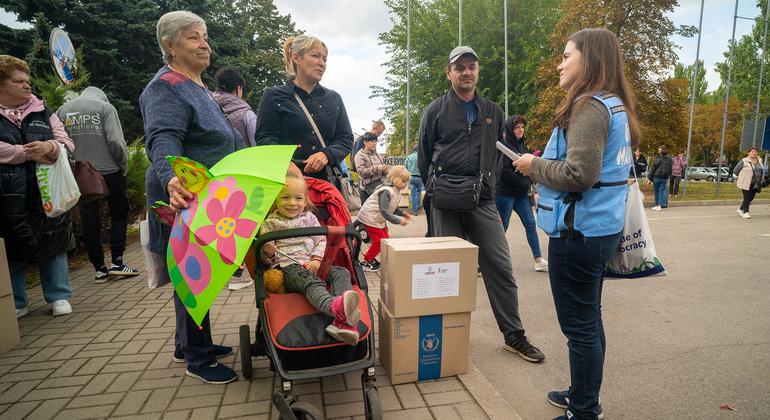World Humanitarian Day: What it means to be an aid worker today

From the ongoing emergencies in Gaza, Sudan and UkraineWe have compiled a collection of moving personal messages from UN humanitarians who reflect on what it means to be an aid worker, exactly 21 years to the day after the bombing of the UN headquarters in Baghdad that killed 22 aid workers, including Sergio Vieira de Mello, the Secretary-General’s Special Representative for Iraq:
GAZA: Louise Wateridge, United Nations Relief and Works Agency for Palestine Refugees (UNRWA):
On colleagues who are too scared to leave their children at home

UNRWA’s Louise Wateridge with her colleague Hussein in Rafah, south of Gaza.
“We also have staff in the north, staff in the south, all over; they are telling us how to They bring their children to work with them because they dare not leave them at home.. They dare not be away from their families in case someone is killed in an airstrike and they are not together. My colleagues told me that they would rather die together than die separately.”
Faced with constant danger and destruction
“We often wake up to new challenges. Even in Khan Younis. You know, we just restored a well – this is an achievement of war. [Providing] water for 100,000 people in the Khan Yunis area, amid the rubble, amid the displaced. And There are tanks in the area now and people are running away.…It is challenging to provide a humanitarian response to these forced displacements, with the bombings and attacks that are taking place, to be able to move safely in the area. It is impossible to be safe in the Gaza Strip.”
consecutive hits
“If we woke up tomorrow and the well in Khan Younis, the biggest source of water for the people there, was destroyed, of course that would be a huge disappointment and a huge outrage for the humanitarian response, for the community here. But I know the staff will pick themselves up, they will continue and they will fix it again, because what else are they going to do? They will not give up. They will continue to do everything they can until we get a ceasefire. Until there is some respite for the people – they will continue to serve their community.”
United Nations Security for Humanity Act
Sudan: Leni Kinzli, United Nations World Food Programme (WFP):
‘This is what I signed up for’
“So. I’ve been an aid worker for six years now and being an aid worker in Sudan basically means never giving up. It’s an incredibly difficult situation to work in, especially for our Sudanese colleagues, and it just means never giving up and never giving up on the belief and hope that you’re making a difference in people’s lives – that the support we’re getting is actually saving lives and supporting people in the darkest of times like we’re seeing in Sudan.
This is what I signed up for. This is what we all signed up for. As an aid worker, you know, there’s no default when it comes to this, you dedicate your life to serving others.”

Leni Kinzli, head of communications for the World Food Programme (WFP) in Sudan.
Unforgettable Testimony
“A recent example that helped me understand what it means to be a humanitarian was my recent encounter in Port Sudan with a woman in her mid-30s who had escaped and was living in Port Sudan, essentially after walking 800km to safety. And she told me in detail everything that she had experienced during the war. She was really moved by it.
But then she also mentioned getting support from World Food Programme Monthly emergency food ration packs helped her make the trip and then reach safety where she was able to share her story with me and also release some of the trauma she had experienced.
She cried in my arms, but to pour it all out and give space for people to share the hardships they have been through and give them the empathy and compassion they deserve after such horrific experiences; that is what it means to be a humanitarian.”
The reality of providing relief
“What aid workers across Sudan, and particularly Sudanese aid workers, are facing, is the most complex operating environment in the world right now. So that means, in the areas where people need help the most, there is fighting going on, there are airstrikes, bombings, shelling in places like Khartoum, the capital (and) the capital of North Darfur.
But along the routes that we have to transport food, there are a lot of checkpoints, a lot of different actors, armed actors involved in different conflict lines, so it is necessary to negotiate and communicate constantly with those parties.”
Ukraine: Emanuele Bruni United Nations World Health Organization (WHO):
Deadly ‘double tap’ threat in Odessa
“Seven months ago after the initial attack, an EMT rushed to the scene of the attack, ignoring the sirens, ignoring the warnings – that’s the spirit of the workers and of the EMTs. The unfortunate story that really breaks my heart is that this EMT, this young EMT, got hit a second time.
[They were] “I was attacked while doing this work for the people, and this is something I will never forget… The attack on the children’s hospital in Kyiv was certainly the most visible attack. But these attacks on emergency medical workers happen every day. I will never forget.”
Health care goals
“Since the beginning of 2024, we have observed a lot of “double tap” hits; essentially [there’s data] that medical staff are three times more likely to be attacked. This completely hampers the response and the health care of the population and the health system. It is very important to reiterate that Ukraine remains a very, very difficult emergency, due to the incredible level of violence.”


